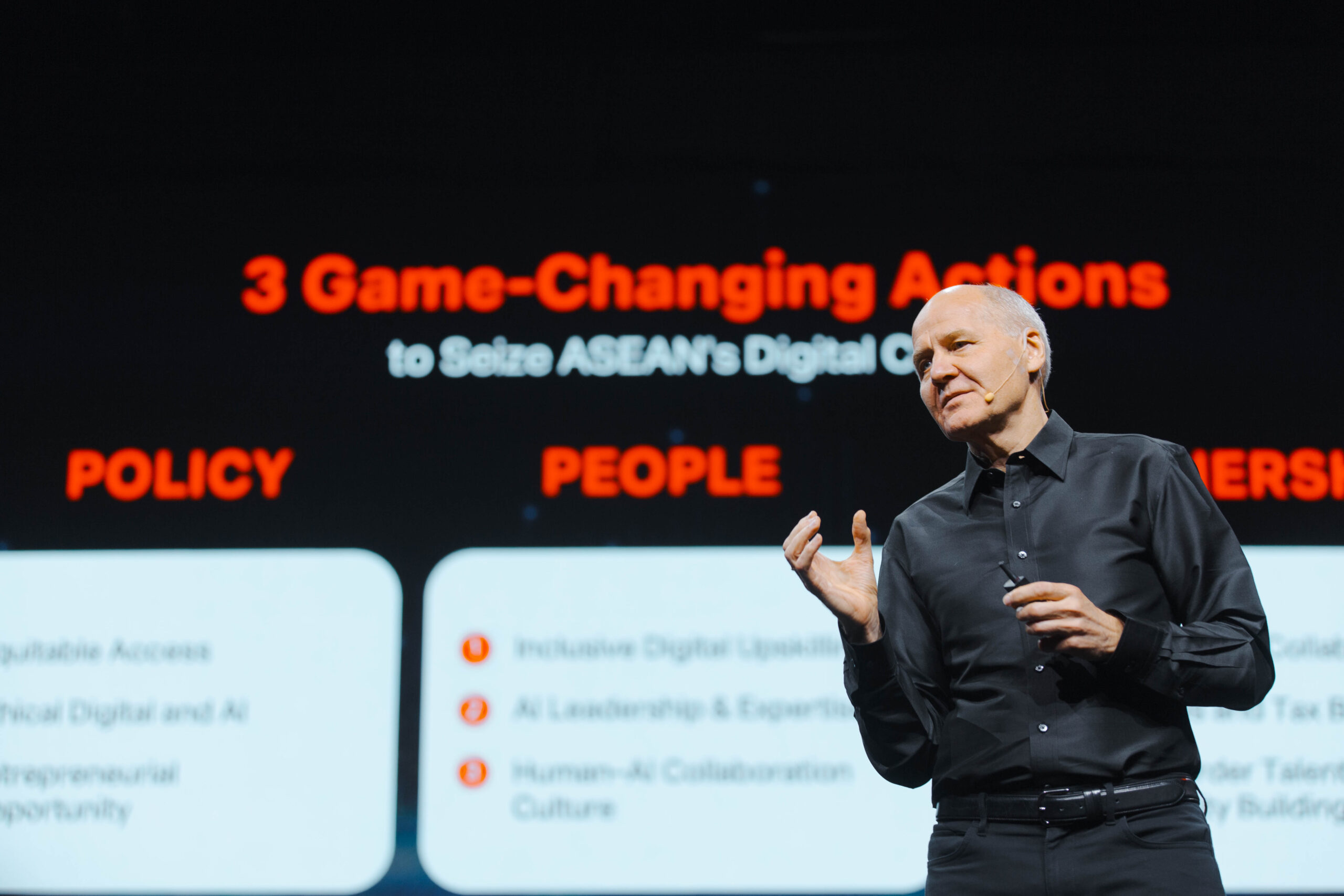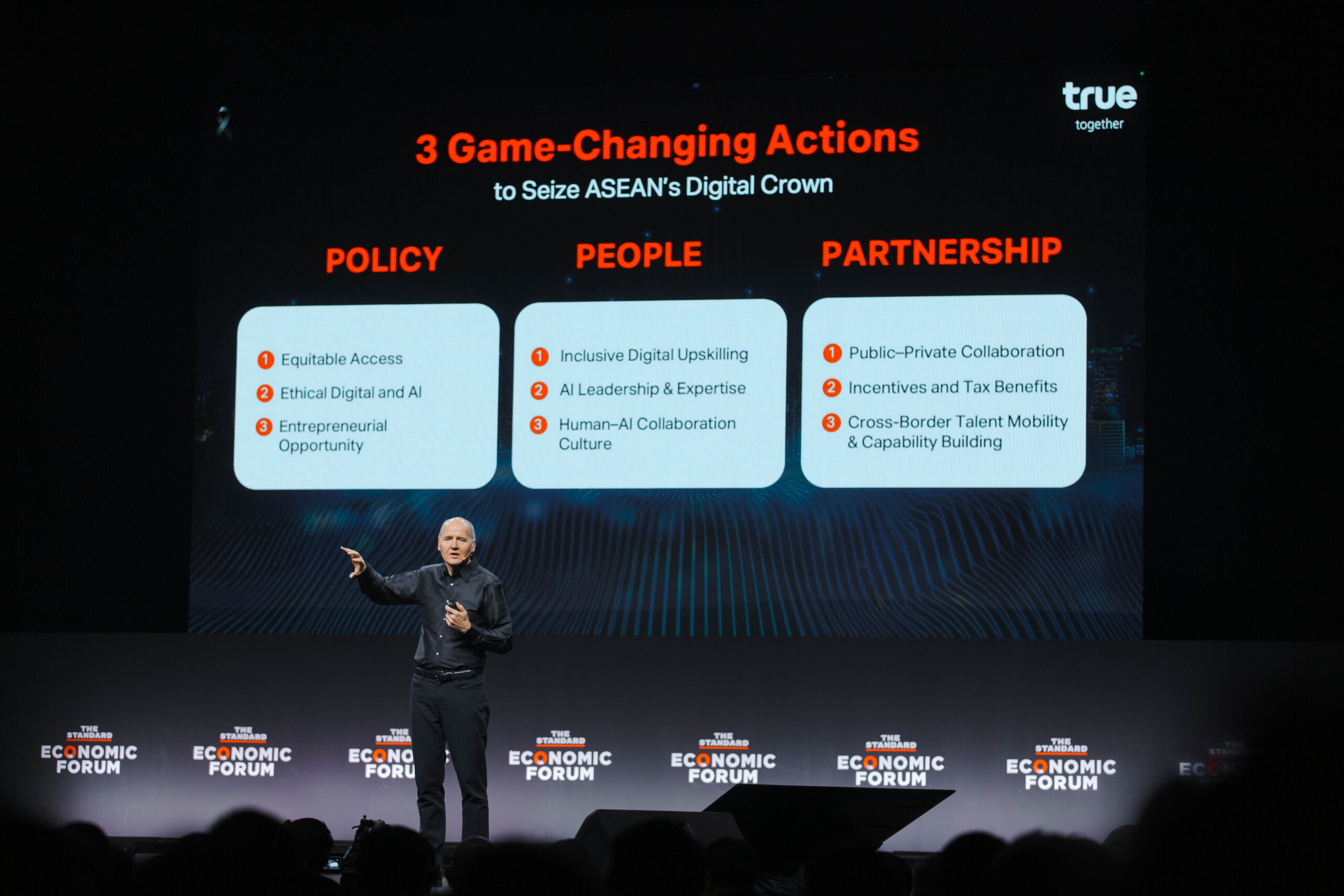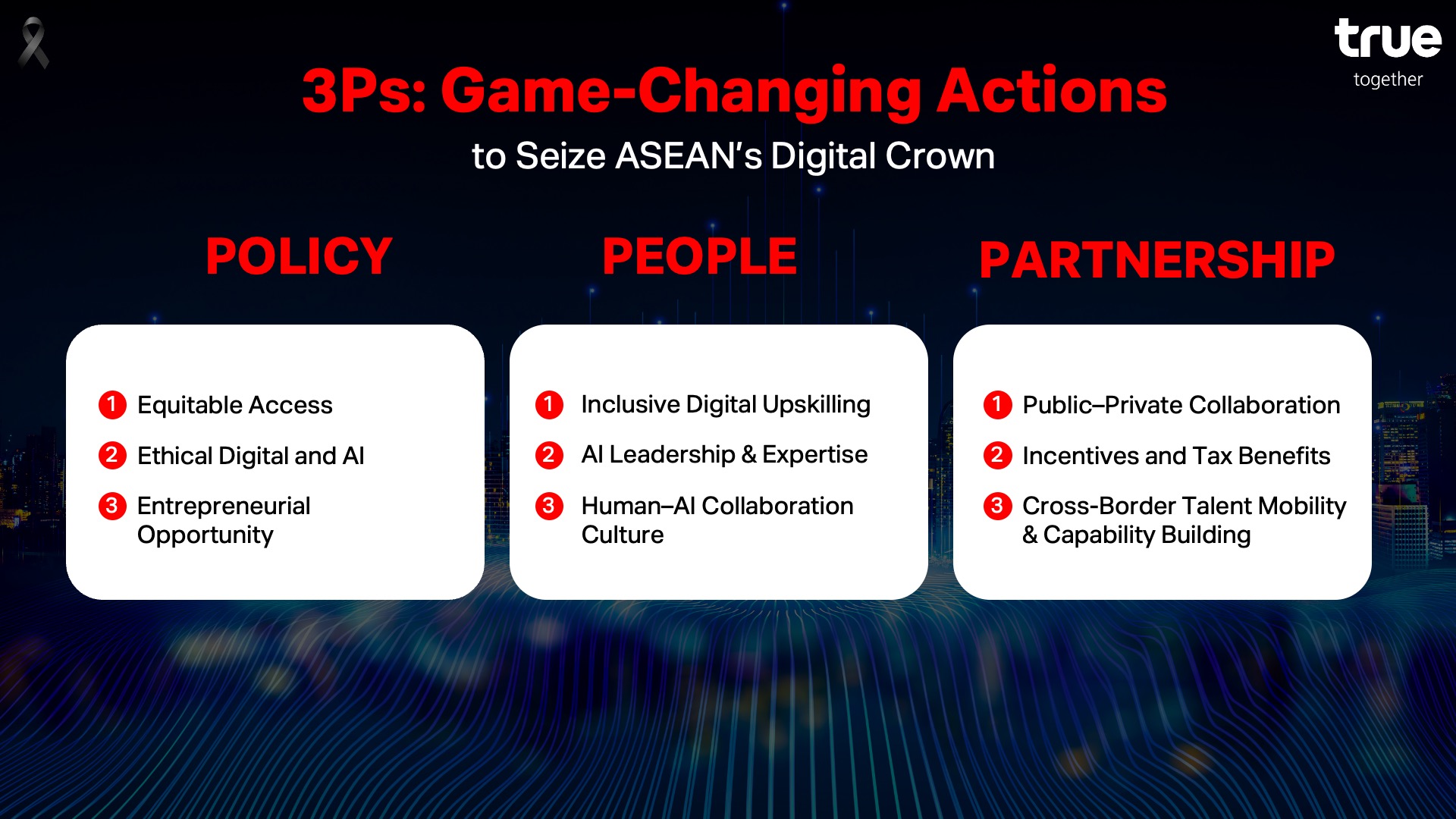The year 2025 is coming to an end with full of twists and turns – politically, socially and economically. But what is certain is uncertainty. It becomes a new normal and is here to stay in the disruptive world where the future is hardly predictable at a more rapid pace.
The development and breakthrough of artificial intelligence (AI) is one of the dominant shifts. Combined with data and automation, frontier technology redefines the world’s economic engine, creating the ‘digital race’ for every nation to survive, strive and thrive.
Sigve Brekke, executive chair of CP Telecom and Digital Group and Group CEO of True Corporation, shared his perspective on “Thailand’s Next Frontier: Digital Game Changer for Thailand – Blueprint for Seizing ASEAN’s Digital Crown” organised by The Standard Economic Forum 2025.
From Electricity to Intelligence
Every industrial revolution begins quietly, then suddenly reshapes everything. When electricity first illuminated parts of London in the 1880s, its promise far exceeded its presence. In the first decade of electrification, its uses were narrow and uncertain, streetlights and electric trams dazzled city streets, but for most people electricity remained a novelty, not yet a necessity of life. Factories still ran on steam; homes relied on gas.
“The birth of electricity accelerated the Industrial Revolution. Then came the Internet era, which transformed every industry over the past decades. And now, AI is about to do the same,” said Sigve.”
Given the structural transformation, uncertain economy, modern consumption shift and technology advancement gave rise to the boom of subscription-based business models across products and services – Everything-as-a-Service (XaaS). Soon, cars, appliances, and tools will be subscribed to rather than owned, powered by predictive systems that optimize cost and convenience. And this proliferation is not only reshaping companies, but entire industries.
“In the future, you may not buy a refrigerator anymore. Instead, you may subscribe to it as a service,” he added.
Just two decades ago, ExxonMobil and General Electric represented industrial might; today, the most valuable firms, NVIDIA, Apple, Microsoft, Alphabet, are built on code, chips, and cloud. According to the World Economic Forum, digital technologies presently share around 15.5% of the global economy. Over the next decade, the estimated 70% of new value creation will be fuelled by digitally enabled business models.
“Technology is no longer a secondary part of the economy; it is the economy itself.” Group CEO of True Corporation pointed out.
All Set to Jumpstart
With a shifting global economic paradigm, countries are in a race against time to find new strategic advantages in the digital sphere. So, where does Thailand stand in this race?
Referring to IMD’s World Digital Competitiveness Ranking 2025, Thailand stands out for its future readiness globally in terms of telecom sector investment and internet bandwidth speed (No.8). The figures highlight sustained public and private sector commitment in building the strong foundations, digital backbone, from networks and towers to data centres and cloud infrastructure.
Thanks to the amalgamation of True Corporation, Thailand has completed ASEAN’s largest network modernization project, achieving 99% for 4G and 94% for 5G coverage nationwide. It is a pivotal step towards delivering unmatched experiences for customers, while the foundation is laid for the country’s future growth.
Due to the combination of energy reliability and strategic centrality, Thailand could also take a leadership role in data centre space to become a regional hub, challenging the current leader Malaysia.
Duality Gap
Digital progress in Thailand is not just institutional, it’s social.
According to the Digital Wallet Intelligence Report 2025, Thai consumers are among the fastest adopters of new technology in the region. E-commerce is growing 19% annually, nearly double the ASEAN average. Fintech adoption has reached 50%, while digital payments are expected to exceed USD 18.6 billion by 2025, placing Thailand among the region’s top three digital economies.
AI usage has also spread rapidly. About 75% of Thais have tried generative AI tools like ChatGPT, not just in Bangkok or Chiang Mai but in smaller towns and agricultural communities. Farmers use AI-driven forecasting apps, small merchants use digital platforms for logistics and payments, and students are learning faster through adaptive tools.
“This shows how fast Thai society is adapting,” Mr Brekke commented.
However, this transformation remains largely consumer-led. Many of Thailand’s core industries, manufacturing, agriculture, and retail, have yet to embed AI deeply into their production and supply chains. This gap between individual adoption and enterprise transformation represents both a vulnerability and an opportunity.
Thailand’s startup ecosystem mirrors this duality. The OECD’s Startup Asia Report showed that during 2021 and 2023 Thai startups attracted only 4% of ASEAN venture capital, compared with Singapore’s 40%. The second largest economy in SEAs has five unicorns, while Singapore has over 20 and Indonesia 10. The gloomy outlook in Thai startups could derail the country’s innovation landscape, posing a higher barrier to economic growth in the long-run.
“The challenge is not the lack of ideas, but the lack of investment and scaling capability,” he added.
3 Priorities: Policy, People, and Partnership
Thailand has reached a decisive inflection point in its digital journey. As the advancement of AI occurs rapidly, the question for the country is no longer whether this transformation will happen – but how quickly it can harness the wave to lead the ASEAN region.
To seize the Digital Crown, there are three areas requiring an upheaval: 3Ps – Policy, People and Partnership.
1. Policy: Government must act as both regulator and enabler. Over the past six years, Thailand has averaged just 34 venture-backed startup deals annually, compared with over 500+ in Singapore. Closing this gap requires faster, more flexible regulation that encourages innovation and capital flow.
Policy should promote three imperatives: equitable digital access for all citizens; ethical and transparent AI governance to build trust; and an entrepreneurial environment where innovators are rewarded, not restrained.
2. People: Even the most advanced technology is meaningless without capable people. The World Economic Forum projects that by 2030, 92 million jobs will disappear globally, but 170 million new ones will emerge, many in AI-driven fields.
To prepare, Thailand must prioritize inclusive digital upskilling, develop AI leaders through research and global learning alliances, and nurture a culture of human–AI collaboration. The goal is not to compete against AI, but to work with it, augmenting human creativity with machine capability.
3. Partnership: No nation can win the digital race alone. Thailand invests just about 1% of its GDP in R&D, half the level of innovation-driven economies. That gap can be bridged through public–private partnerships, incentives for global R&D collaboration, and talent exchange programs across ASEAN. By fostering regional cooperation with universities and technology leaders, Thailand can build the world-class human capital needed for the AI age.
To unlock the full potential of AI, the success is heavily relied on human-machine collaboration, making sure the right relationship between people, process, and technology. Additionally, Thai-language and culturally aware AI system development must be concerned to ensure inclusivity, fairness, and accessibility for all Thais.
“AI should be assistive, inclusive, and collaborative, not a substitute for human potential.” He stressed, adding that if electricity democratized opportunity in the 20th century, AI must democratize knowledge and productivity in the 21st.
A Defining Moment
Thailand’s digital transformation is no longer a question of readiness, it’s a matter of leadership. The nation has robust infrastructure, an eager population, and a strategic location at the heart of ASEAN. What remains is execution: aligning policy reform, people empowerment, and partnership synergy.
Today, the country stands at the same threshold as London once did when electricity began to light its streets. The spark is already here, what Thailand needs now is the courage to power it forward.
“The race has already begun. It’s not about catching up, it’s about leading. And Thailand is ready.” Group CEO concluded.









